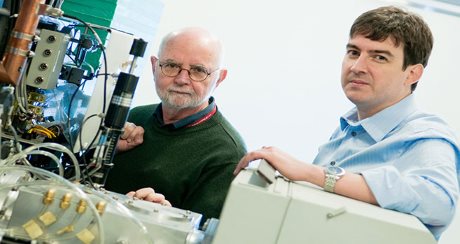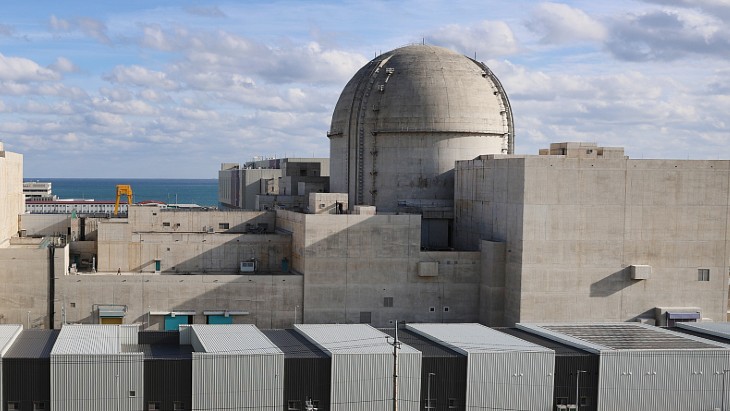A research team based in Vancouver, Canada has almost quadrupled the rate of production of medical radioisotopes using a cyclotron. The milestone was reached by the Triumf project at the University of British Columbia in December.
 |
| Lead researchers Tom Ruth and Francois Bernard with one of the Vancouver cyclotrons (Image: University of British Columbia/Martin Dee) |
Cyclotrons are being investigated as an alternative to research reactors for the production of medical radioisotopes. Only a small number of research reactors around the world produce the molybdenum-99 (Mo-99) used as precursor for the technetium-99m (Tc-99m) employed in around 80% of all nuclear medical procedures. The radioisotopes are short-lived and cannot be stockpiled, and the supply chain has shown its vulnerability to interruptions from unplanned outages at the producing reactors in recent years.
Canada already produces around 40% of the world's supply of Mo-99 in the NRU reactor at Chalk River, but the unit is scheduled to close in 2016 after nearly 60 years of service. The Canadian government has invested in projects, including Triumf, to bring non-reactor-based radioisotope technologies to market through its ITAP (Isotope Technology Acceleration Program) initiative.
Tc-99m can be produced directly in a cyclotron by bombarding a molybdenum-100 (Mo-100) target with a proton beam. Production of Tc-99m using cyclotrons does not require uranium targets: the high-enriched uranium targets that are commonly used in the reactor-based production of Mo-99 are widely cited as a potential nuclear proliferation risk. However the very short half-life of Tc-99m means that the isotope must be used quickly after production, limiting its use geographically to the area close to the cyclotron facility.
According to the University of British Columbia Triumf's latest cyclotron demonstration, which saw the production of enough isotopes in six hours to enable about 500 scans, creates a "viable alternative" to NRU.
Clinical trials involving between 50 and 60 patients are expected to begin this summer to prove that the cyclotron-produced medical isotopes behave in the same way as those from nuclear reactors. If the three-month trials are successful, the university says, one of Triumf's cyclotrons "would likely be dedicated to medical isotope production" possibly as soon as 2016.
Researched and written
by World Nuclear News




_30199.jpg)
_72306.jpg)







